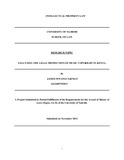| dc.description.abstract | The Kenya Society has placed immense emphasis on tangible property such as land as a means of production and as a development mode. Intellectual property rights have hitherto been ignored. It is only in the year 2001 that Kenya legislated on Copyright matters. Although the Government has enacted laws regarding protection of music copyrights, the enforcement and implementation of these laws have not been wholly effective. This is due to deliberate non–adherence to the law, a situation that is encouraged by a weak enforcement mechanism. The general objective of the study was to critically examine the effectiveness of the Copyright Law in Kenya with particular reference to the Copyright Act 2001 and to suggest recommendations intended to strengthen the relevant enforcement agencies. Specifically, the research sought to determine the following: the extent to which music piracy has deprived the Kenyan artists of IPRs in their works; the pitfalls in the legal frame work of copyright laws in
Kenya; the existing enforcement mechanism of Copyright protection in Kenya; and the practical solutions to music piracy in Kenya. The data and information pertaining to this study was obtained through documentary research. Relevant literature from books, academic papers, journals, newspapers and the internet. The data obtained has been presented and analysed both qualitatively and quantitatively. The use of percentages has been employed as much as possible. Key informant interviews and consultations with KECOBO, the Judiciary and the Police were carried out in a bid to gather information from the relevant Government institutions. The findings of this research are significant to the stakeholders in the music industry and the Government as we seek to effectively protect Intellectual Property Rights. In due time, the music copy right holders will be able to reap the justifiable fruits of their sweat. The research offers solutions necessary to enhance the protection of music copyrights in Kenya so as to motivate the artistes and spur growth within the industry hence increase revenues to the individual musicians and the government thus leading to overall development. Moreover, the study will also contribute to the field of legal research in general and intellectual property law in particular. Legal scholars may deem the findings useful to develop further
research, which could lead to eventual elimination of music copyright infringement | en_US |

